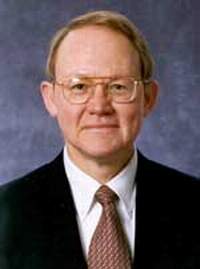George W. Bush wishes to be America's new spy chief
President George W. Bush's choice to be America's new spy chief works as a $2 million (EUR 1.54 million) -a-year private consultant with some of the same senior military and intelligence officials he would supervise as director of national intelligence.

Retired Vice Adm. Mike McConnell could face an unusually daunting challenge avoiding ethical entanglements after a decade working with Booz Allen Hamilton Inc., a large defense and intelligence consulting company with sales of $3.7 billion (EUR 2.85 billion) worldwide, according to an extensive Associated Press review of McConnell's finances and business deals.
McConnell's Senate confirmation hearing is set to begin Thursday.
A Senate Intelligence Committee member, Democratic Sen. Ron Wyden, said he already has urged McConnell to be prepared to discuss his work as a consultant and its implications on the job of chief over all U.S. intelligence agencies. Those agencies rely heavily on work by outside consultants, who often are hired under contracts kept secret for national security reasons.
"I'm going to bring it up," Wyden said. "I made it clear that I was going to be asking questions about issues relating to his work with contractors."
In May, for example, McConnell and other company executives met privately in San Antonio with Major Gen. Craig Koziol, a top Air Force intelligence officer in charge of cyberwarfare, according to records obtained by the AP under the Freedom of Information Act. The company bid months later on a related contract from the Air Intelligence Agency, part of the U.S. intelligence community that McConnell would oversee as the national director.
More than half Booz Allen Hamilton's sales come from such government contracts. McConnell's closest colleagues at the company anticipate intense scrutiny over its future relationship with him as the overseer of the nation's 16 spy agencies.
"I will never be able to go in and see him in his office," said Richard Wilhelm, a Booz Allen Hamilton senior vice president who has worked with McConnell for more than 30 years. "He's said, 'Unfortunately, I'll not be able to talk to you guys anymore.' We'll have to be very careful."
Efforts to reach McConnell through the White House and through Booz Allen Hamilton were unsuccessful. Presidential nominees routinely do not speak publicly or with reporters before Senate confirmation hearings.
The White House promised that McConnell would divest any financial holdings in Booz Allen Hamilton if he is confirmed as intelligence chief. In addition to his $1,999,840 (EUR 1,541,659) salary, McConnell owns $1 million (EUR 770,000) to $5 million (EUR 3.85 million) in company stock, plus up to $1.15 million (EUR 890,000) more in other investment funds owned through the company, according to financial reports he submitted to the White House.
McConnell would earn $186,600(EUR143,848) annually as director of national intelligence.
"There has to be the highest level of oversight within the agency and Congress to make sure any appearance of impropriety is totally investigated and erased," said Scott Amey, general counsel for the Project on Government Oversight, a Washington-based whistleblowers group. Amey said public scrutiny over classified intelligence contracts is limited because of secrecy.
Booz Allen Hamilton and the intelligence director's office separately said each will vigorously enforce ethics rules related to McConnell and the company.
In a statement, the agency pledged to refer potential business conflicts to ethics officers inside federal agencies.
A Booz Allen Hamilton spokesman, George Farrar, said the company will establish contracting firewalls to avoid conflicts with McConnell. "That has to be the case," Farrar said. "You have to maintain absolutely by-the-rules contracting."
McConnell's nomination comes in the midst of a broad, government-wide review by the intelligence director's own office about the role of private contractors in U.S. spy agencies. That report, which will examine whether the government hires too many such contractors, is nearly finished but has not yet been sent to Congress.
McConnell, a former director of the National Security Agency until 1996, is described by those who have worked with him as an affable and well-respected intelligence expert. He is credited with recognizing more than a decade ago the risks from electronic attacks by foreigners against important U.S. computer networks - years ahead of many other government officials.
McConnell is still expecting an unspecified lump-sum retirement payment, an unspecified bonus and an unspecified payment to his retirement account from Booz Allen Hamilton, according to his financial records. The company also will continue to pay for his medical and dental insurance.
Separately, McConnell draws $90,944 (EUR 70,108) annually from his Navy retirement and owns smaller amounts of stock in other companies that also work extensively with the U.S. government, including Halliburton Co., Boeing Co., L-3 Communications Holdings Inc., Cisco Systems Inc., Oracle Corp., Microsoft Corp. and others. He also earns $16,000 (EUR 12,334) as a board member for CompuDyne Corp., which sells security systems to the federal government, and $30,000 (EUR 23,127) as chairman of the Intelligence and National Security Alliance, a trade group that lobbies the government on intelligence matters, the AP reports.
It was unclear how much McConnell's finances have changed since he left U.S. government work in 1996. The National Security Agency, which he led, told the AP it could not locate McConnell's financial records from that period in its files. It suggested the records might have been destroyed because so much time had passed since he worked there.
Subscribe to Pravda.Ru Telegram channel, Facebook, RSS!




